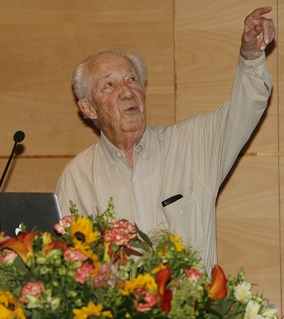Top 35 Quotes & Sayings by Christian de Duve
Explore popular quotes and sayings by a Belgian scientist Christian de Duve.
Last updated on April 14, 2025.
My parents, of Belgian-German extraction, were Belgian nationals who had taken refuge in England during the war. They returned to Belgium in 1920, and I grew up in the cosmopolitan harbour city of Antwerp, at a time when education in the Flemish part of the country was still half French and half Flemish.
The cost of our success is the exhaustion of natural resources, leading to energy crises, climate change, pollution, and the destruction of our habitat. If you exhaust natural resources, there will be nothing left for your children. If we continue in the same direction, humankind is headed for some frightful ordeals, if not extinction.
If you equate the probability of the birth of a bacteria cell to chance assembly of its atoms, eternity will not suffice to produce one Faced with the enormous sum of lucky draws behind the success of the evolutionary game, one may legitimately wonder to what extent this success is actually written into the fabric of the universe.





















